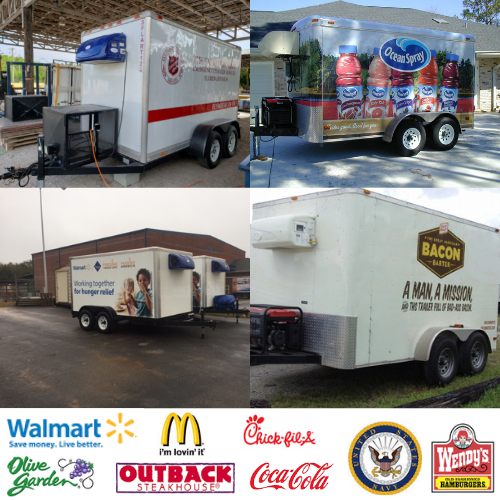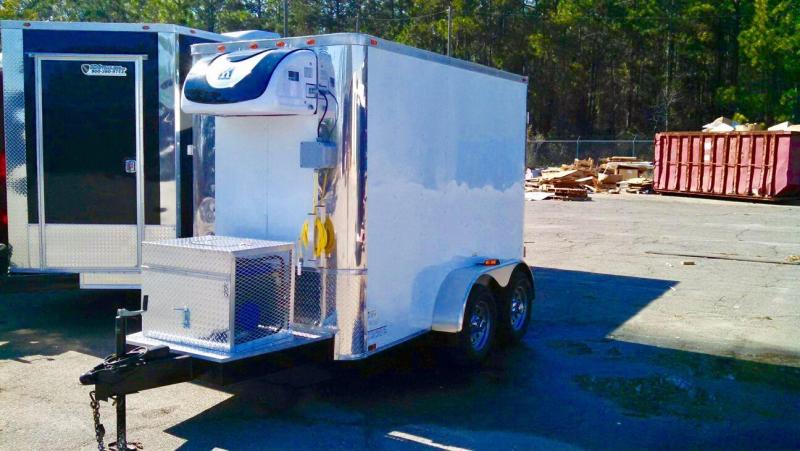The Ultimate Guide to Choosing the most effective Chilled Trailers
When it comes to selecting the optimal cooled trailer for your company needs, various aspects need to be carefully thought about to guarantee optimum performance and performance. From the different kinds of chilled trailers offered to the essential functions such as dimension, temperature control, and power efficiency, each aspect plays a vital duty in establishing the most effective suitable for your specific demands. Additionally, maintenance and service ideas are vital to prolonging the life-span of your cooled trailer. By exploring the complexities of these considerations, you will be furnished to make an informed choice that lines up with your operational objectives and budget plan restrictions.
Types of Refrigerated Trailers

When taking into consideration the types of chilled trailers, it is vital to evaluate their details attributes and capabilities to match the transport needs of perishable products. The 2 key sorts of cooled trailers are reefer trailers and protected trailers. Reefer trailers, brief for cooled trailers, are outfitted with cooling down systems that actively manage the inner temperature level to maintain perishable products at the needed conditions during transportation. These trailers are perfect for items like fresh fruit and vegetables, dairy, meat, and pharmaceuticals that call for specific temperature control - small refrigerated trailer- cooler trailers.

Size Considerations
Considering the dimensions of the cooled trailer is crucial to make sure optimum storage space capability and reliable transportation of subject to spoiling products. When selecting the dimension of a chilled trailer, it is essential to think about the volume of products that need to be transferred. Bigger trailers use even more storage area, making them appropriate for organizations with substantial shipping requirements. Smaller sized trailers are much more maneuverable and economical for organizations with minimal tons or minimal storage room at their facilities.
An additional element to consider when establishing the size of the chilled trailer is the measurements of the goods being delivered. Some goods might have details size requirements or need to be stacked in a particular way to stop damages. For that reason, picking a trailer size that suits the measurements of the products will help preserve their high quality throughout transportation.

Temperature Control Attributes
Effective administration of temperature level control in cooled trailers is vital for maintaining the quality and security of perishable items throughout transport. When picking a chilled trailer, it is important to think about the temperature control features it supplies. Try to find trailers outfitted with sophisticated temperature surveillance systems that give real-time data on the interior conditions. These systems should have precise temperature settings and informs for any variances, ensuring that the freight stays within the called for temperature range.
Additionally, some refrigerated trailers feature multi-zone temperature control capabilities, allowing various compartments to keep varying temperatures as required for various kinds of goods. When transporting a mix of subject to spoiling products with unique temperature level requirements, this function is especially beneficial. Furthermore, trailers with efficient insulation and temperature level uniformity throughout the freight space aid avoid warm or chilly areas, guaranteeing consistent conditions for all goods being transported
Power Performance Aspects
A crucial element to assess when selecting a chilled trailer is its energy efficiency, which plays a considerable function in lowering operational prices and ecological influence. Energy efficiency aspects to consider consist of the insulation quality of the trailer, the kind of refrigeration system made use of, and any kind of additional features that contribute to lowering power intake. Premium insulation is critical as it helps preserve the preferred temperature level inside the trailer with very little energy loss. Modern refrigeration systems, such as those making use of advanced innovation like electric standby alternatives or solar energy, can additionally enhance energy efficiency. Furthermore, functions like automatic defrost cycles, temperature level surveillance systems, and reliable airflow layout can further enhance power use. By prioritizing energy-efficient chilled trailers, services can not only save money on operating costs but additionally reduce their carbon impact, making a positive payment to sustainability you could try these out efforts in the transport market.
Maintenance and Solution Tips
Offered the important role of power efficiency in lowering functional expenses, it is critical to develop an aggressive upkeep and service routine for cooled trailers to make sure optimal performance and longevity. Additionally, checking the trailer's tires, brakes, lights, and electric systems is crucial to assure reliable and safe operation. Teaming up with a respectable solution provider for routine maintenance checks and attending to any type of problems quickly can substantially expand the lifespan of the chilled trailer.

Conclusion
Finally, selecting the best refrigerated trailer entails thinking about numerous elements such as the sort of trailer, dimension needs, temperature level control features, power efficiency, and upkeep needs. By evaluating these aspects very carefully, companies can ensure they select a refrigerated trailer that satisfies their certain demands and requirements, inevitably causing more effective transportation and storage space of temperature-sensitive items.
The two key types of refrigerated trailers are reefer trailers and protected trailers (small refrigerated trailer- cooler trailers). Reefer trailers, short for cooled trailers, are geared up with cooling down systems that actively visit this website regulate the internal temperature to keep disposable goods at the necessary conditions during transportation.On the other hand, shielded trailers are created to maintain the temperature of the items utilizing the insulation residential or commercial properties of the trailer wall surfaces. While they do not have active air conditioning systems like reefer trailers, shielded trailers are appropriate for goods that require protection from external temperature variations however do not call for as rigorous temperature control as subject to spoiling products.Efficient monitoring of temperature control in cooled trailers is vital for maintaining the high quality and safety and security of disposable products during transportation
 Danny Tamberelli Then & Now!
Danny Tamberelli Then & Now! Mara Wilson Then & Now!
Mara Wilson Then & Now! Ross Bagley Then & Now!
Ross Bagley Then & Now! Brandy Then & Now!
Brandy Then & Now! Julia Stiles Then & Now!
Julia Stiles Then & Now!